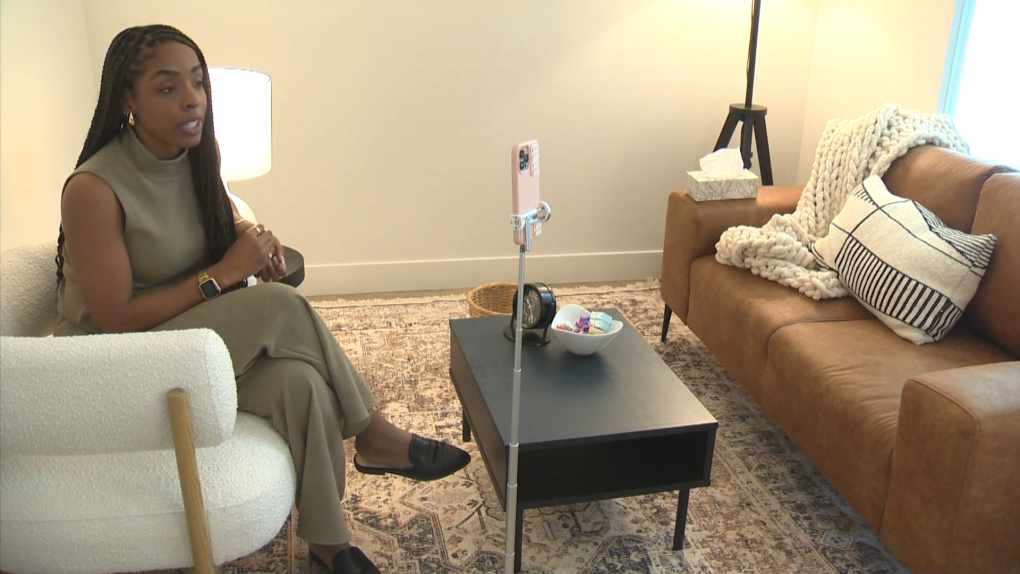‘The gap is pretty large’: Therapist bridging gap in mental health care for racialized Canadians

A Calgary-based trauma therapist is filling a gap in the mental health community for racialized Canadians, both in-person and online.
Simone Saunders, a therapist with a Master’s degree in clinical social work, founded The Cognitive Corner, a practice that provides culturally responsive therapy and mental health care for everyone, including Black, Indigenous and other people of colour.
“Just breaking down a lot of the mental health struggles people go through both through a general lens, but also a lens if you’re in a community of colour,” she says.
“I think it’s really taking a look (at) how do these things look in these different cultures, how do I appreciate that and integrate that into somebody’s mental health care so it’s not a sort of one-size-fits-all approach.”
Saunders began creating content on her TikTok account @thecognitivecorner in 2019 in an effort to offer accessible mental health information and resources, and quickly amassed more than half a million followers.
Her videos, which share her personal experiences in therapy and as a Black woman, resonated with people online and motivated her to open the physical space in Calgary.
“The feedback that I’ve heard is that it has been really nice to be in a space with someone who looks like them and understands a lot of these experiences without having to over-explain,” Saunders said.
“I think that’s the biggest thing (I hear), ‘I have to constantly over explain a lot of my experiences, a lot of the cultural norms, a lot of the pieces that make up my family or make up my identity.’”
Saunders also recognized the gap in mental health for people of colour through her personal experience searching for a therapist.
“Bringing it back to when I was struggling to find a therapist that looked like me, I think it’s about appreciating and integrating the unique parts about yourself into your mental health care,” she said.
“It’s a large part of my identity and (a) large part of the way I move through the world and take up space in the world. So, I think when the therapeutic relationship lacks that understanding, then of course it impacts me understanding parts of my identity.”
Saunders said the Cognitive Corner aims to hold space for people of colour both in person and online that historically has not catered to such audiences.
A survey by the Mental Health Commission in 2021 found 38.3 per cent of Black Canadians with mental health issues used mental health services between 2001-2014 compared to 50.8 per cent of White Canadians.
Another study published in 2021 in Health Promotion and Chronic Disease Prevention in Canada also found barriers to accessible mental health services among Alberta youth, disproportionately affect those with lower socioeconomic status, including racialized minorities, immigrants and refugees.
“The gap is pretty large. I think that radicalized people in general take up the minority of the mental health space or therapeutic space in general so, I think it can be really difficult for a lot of people of colour and Black people especially to see themselves in the mental health field,” she said.
Nicole Johnson is a committee member of Black Physicians of Canada and an associate professor at the University of Calgary. She said that lack of representation also transcends to those offering the care.
“No matter what specialty you choose we are less represented in terms of Black professionals compared to our presence in the general population,” she said. “Historically there are systemic barriers that led to that.”
Johnson said practices like the Cognitive Corner are key in increasing uptake in mental health care among racialized Canadians.
“You can imagine if you’ve been traumatized by other systemic factors, systemic discrimination and racism, then having someone who is race concordant allows you to feel safe, as they might understand your living experience,” she said.
“Until we have that improved representation of race concordant, it’s still appropriate to ask of our non-race concordant therapists to think about learning skills that can enhance patient cultural safety.”
Saunders says she’s proud of the community she has built online and wants to nourish and grow that community locally in Calgary.
“It has been incredible to see people relate to each other and see themselves in these experiences and not feel isolated,” she said.
View original article here Source









